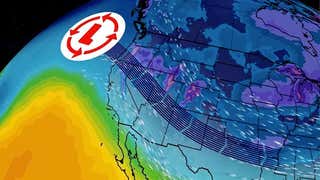


The remote Neumayer-Station III, a German research center in Antarctica that focuses on climate research and other related topics. A new study showed that spending more than a year at the station can cause the human brain to shrink.
(Alfred-Wegener-Institut/Thomas Steuer)
A new study looked at the brains of nine people who spent time at a remote research post.One part of their brains shrunk an average of 7%.The results were similar to those seen in people with Alzheimer's Disease or PTSD.
Call it the ultimate brain freeze.
Researchers have discovered that living at a lonely research outpost in Antarctica for more than a year shrinks the human brain.
It's not the temperatures as low as minus 58 degrees that do it, though. The study's lead author says it's actually the social isolation of living with just eight co-workers, and the day-to-day monotony of being surrounded by miles and miles of whiteness.
"Communication with the outside world is extremely limited. While there is an internet connection, this runs via satellite ," study lead Alexander Stahn, of the Institute of Physiology at Berlin's medical university and an assistant professor at the University of Pennsylvania, said in a video.
"There is hardly any privacy, no escape from the daily reality of life in the Antarctic. Even emergency evacuations are limited to certain times of the year and are nearly impossible during approximately eight months which make up the Antarctic winter."
(MORE: In Florida Keys, Not Every Road or Home Can Be Saved From Sea Level Rise)
Stahn and his colleagues studied the brains of nine people who spent 14 months at Neumayer-Station III, a German center that focuses on climate research and other related topics.
Through imaging, cognitive tests and other benchmarks taken before and after the team's stint at the station, the scientists found that one part of the team members' brains had shrunk an average of 7.2%. The effects were shown in an area of the hippocampus responsible for spatial thinking and memory.
"We were rather surprised by our findings, mainly because of the extent of the observed changes," Stahn said. "In fact, changes this pronounced are normally only seen in certain groups of patients, such as those with Alzheimer's Disease or post-traumatic stress syndrome."
The results in the New England Journal of Medicine.
Similar results were previously observed in mice, Stahn said. The study was conducted to see how the isolation of space travel could affect the human brain, and the Neumayer station provided the perfect conditions. He cautioned that the study group was small, so more research is needed.
(MORE: A Look Back: The Images of 2019)
The researchers' next plan is to look at ways to combat the impact of isolation on the brain, possibly through exercise, diet or nutritional supplements.
"Ultimately, we would like to be able to identify predictors ... which can tell us in advance who is most likely to react strongly to this type of social isolation," Stahn said.
And just how does it feel to spend time in such a remote location?
"It’s very exciting to see ," Stahn told Science News. "But then, it’s always the same."
The Weather Company’s primary journalistic mission is to report on breaking weather news, the environment and the importance of science to our lives. This story does not necessarily represent the position of our parent company, .




